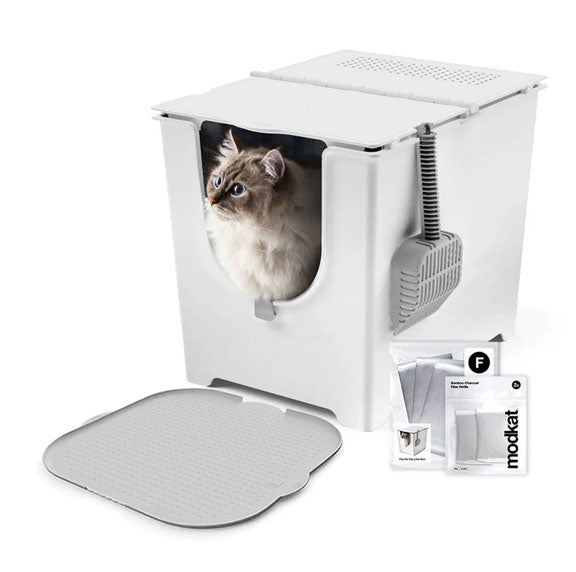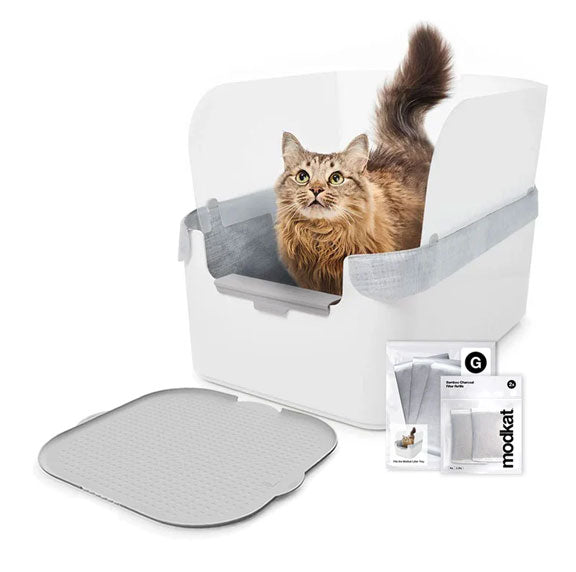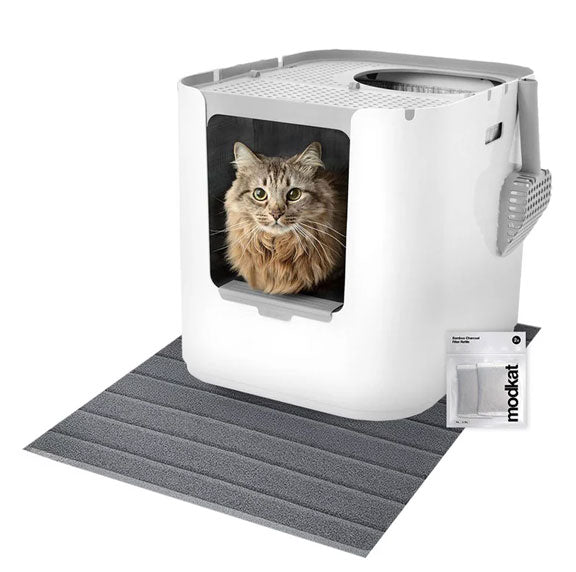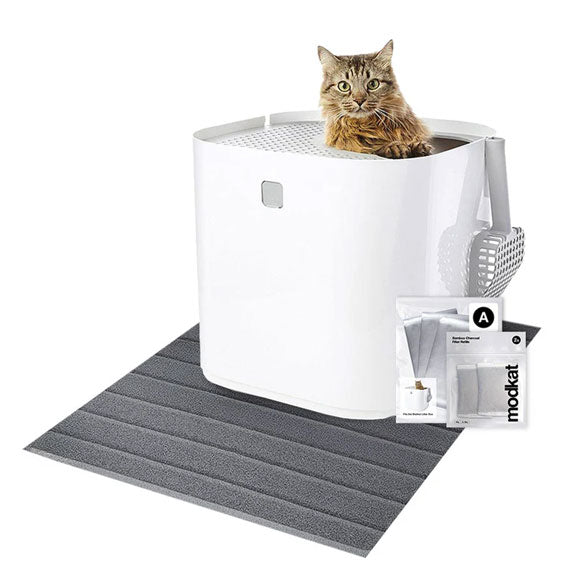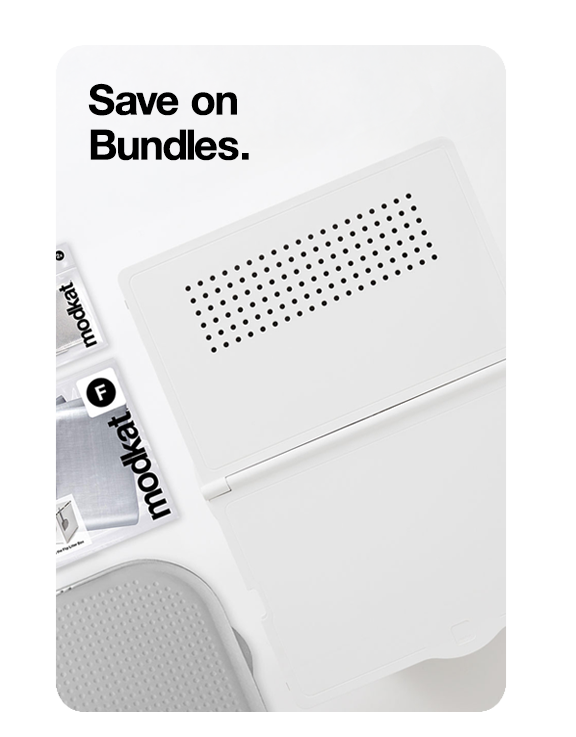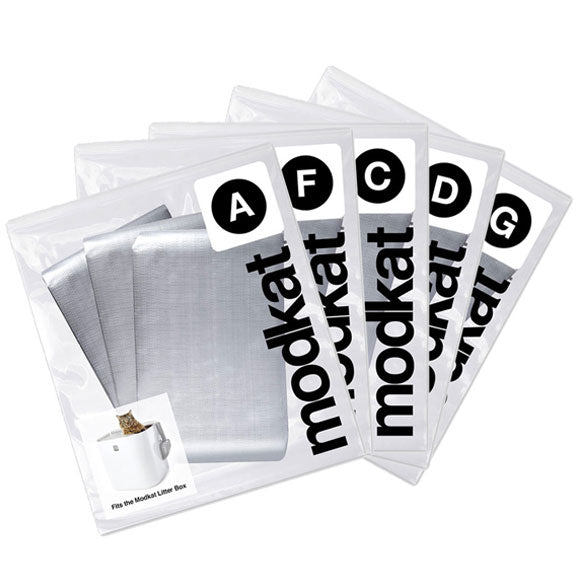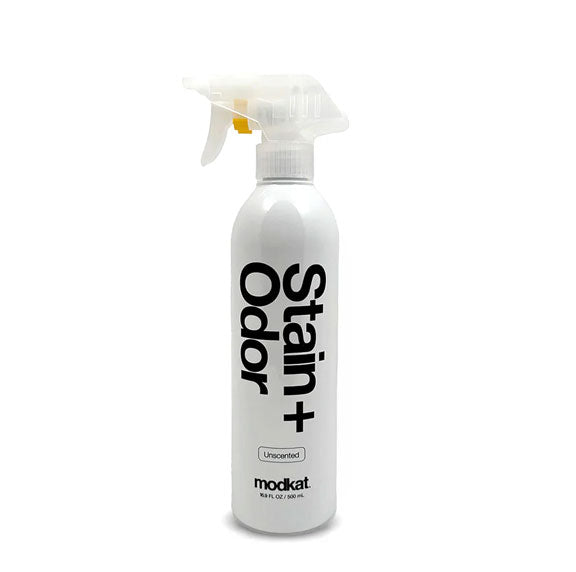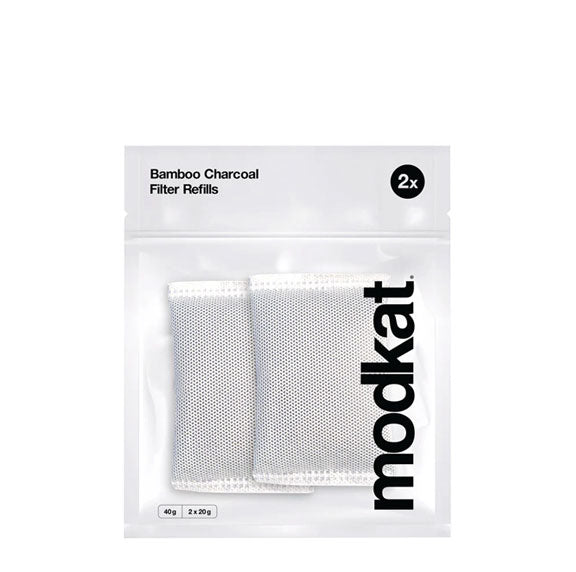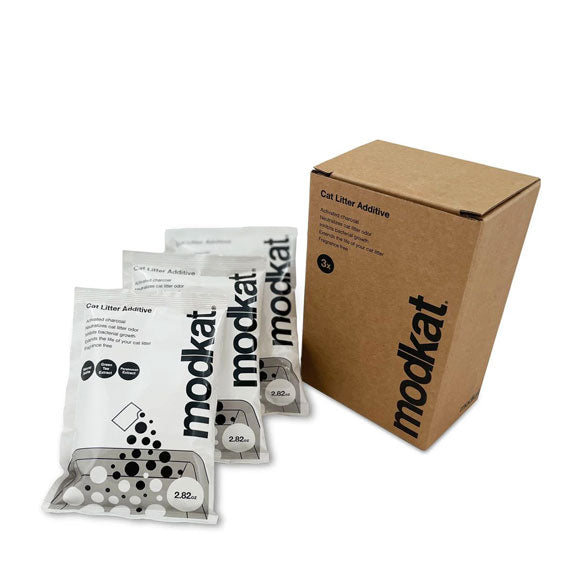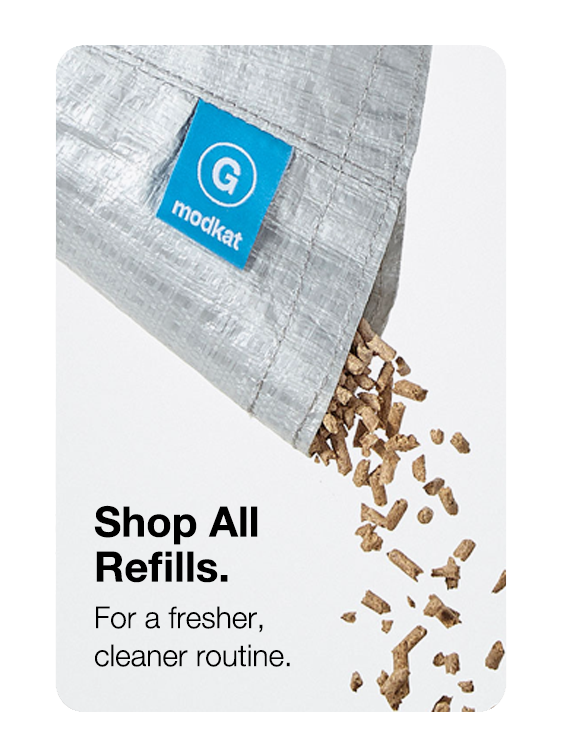Litter Boxes
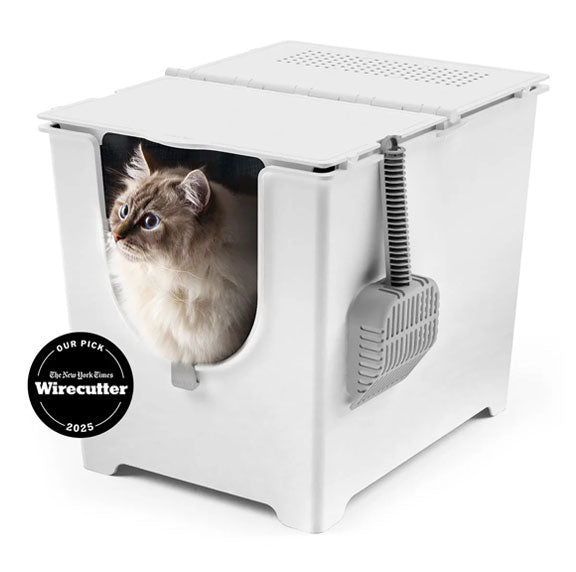
Modkat Flip
Front-Entry Litter Box
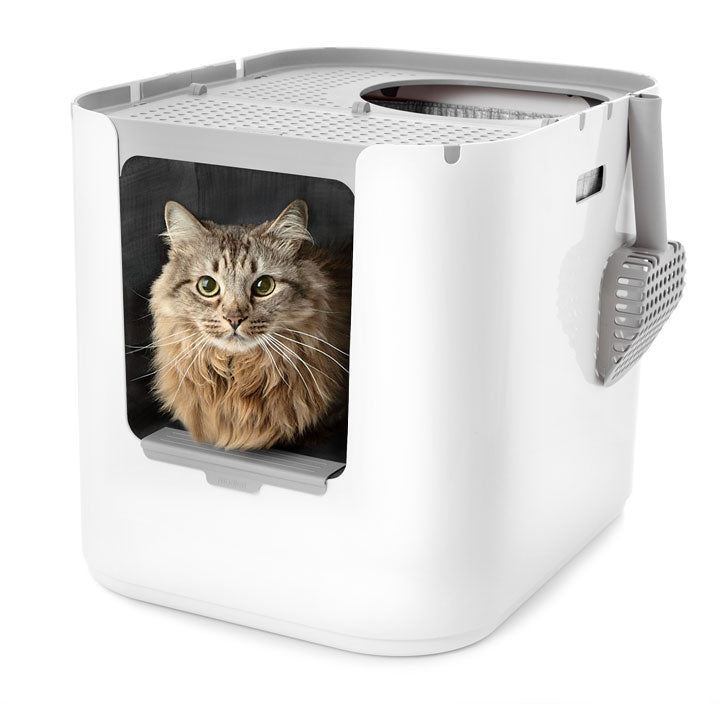
Modkat XL
Front/Top-Entry Litter Box
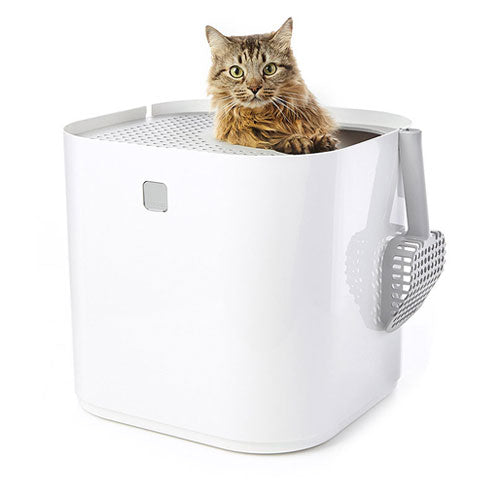
Modkat
Top-Entry Litter Box
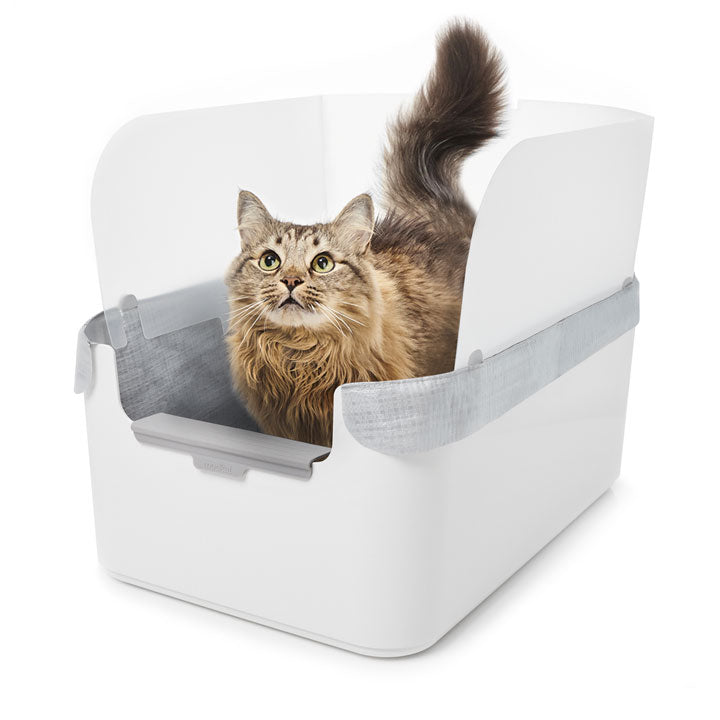
Modkat Tray
Open Litter Box
Bundles
Essentials
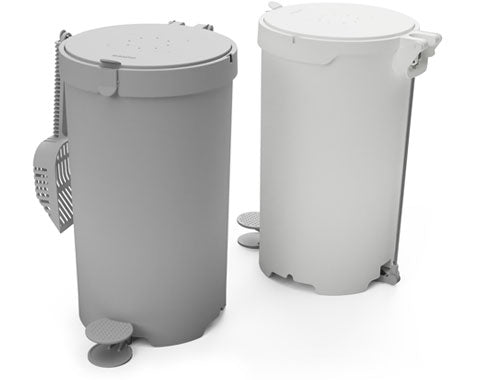
Litter Keeper
Two colors
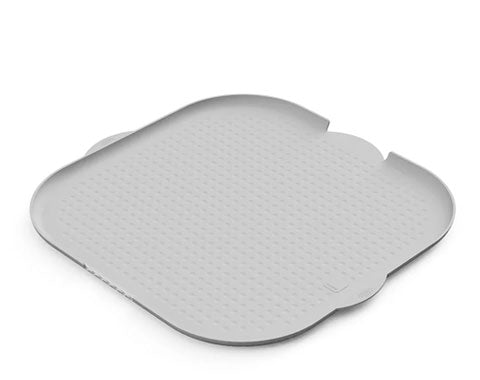
Litter Mats
Multiple styles, colors & sizes
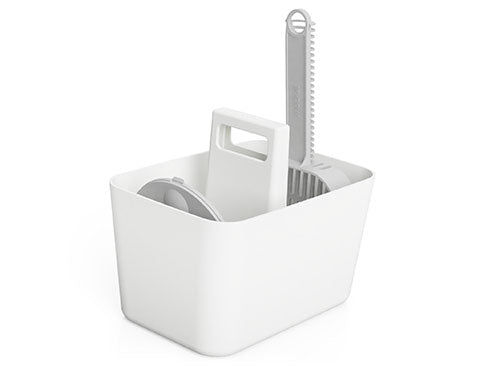
Tidy-Up Kit
Scoop holder & dustpan
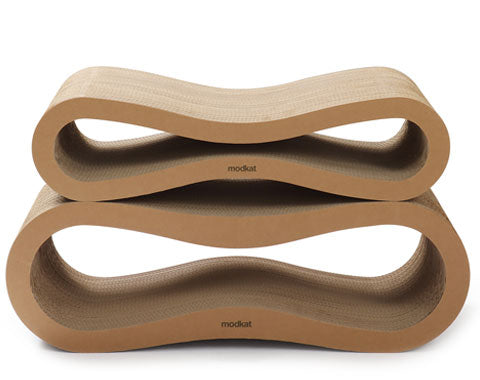
Lounge + Play
Scratchers & toys
Refills
Add description, images, menus and links to your mega menu
A column with no settings can be used as a spacer
Link to your collections, sales and even external links
Add up to five columns
Add description, images, menus and links to your mega menu
A column with no settings can be used as a spacer
Link to your collections, sales and even external links
Add up to five columns
How often do I really need to clean my cat's litter box?
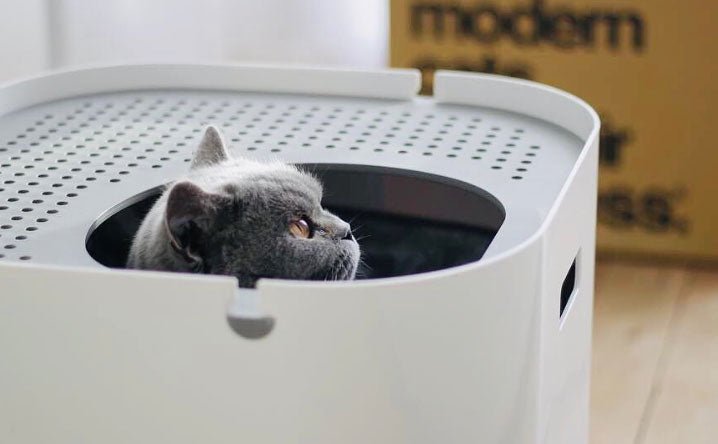
pic: @sparkthecat
The key to a happy, healthy cat is a clean litter box.
Not only does a dirty litter box smell, but it can also harbor bacteria that cause feline illnesses. So make sure your box gets clean, stays clean, and employs an effective odor-control mechanism. This makes sure you and your feline friend stay happy and healthy for the years to come!
Below are some cleaning tips for your cat box, including advice on how often you should change cat litter.
How many litter boxes should you have?
The number of litter boxes you need directly correlates to the number of cats you have and the number of levels in your home. A general rule of thumb is to have one litter box per cat, plus one extra. So if you have one cat, you should ideally have two litter boxes. If you have two cats, you should have three litter boxes, and so on.
Algebraically, we express the equation for how many litter boxes you need as follows:
# of household😺 + 1 extra box = Total Number of Litter Boxes You Need
Do you have two or more levels in your home? You'll need at least one box on each floor — no matter how many cats you have. It's also recommended to have one litter box for every 500 square feet of living space. Big houses need extra cat boxes.
Why do you need so many litter boxes?
- Reduce competition among cats, and help prevent territorial issues. Cats can get particular about their bathroom habits, and furnishing more than enough litter boxes ensures that each cat has their own space to eliminate without feeling stressed or anxious.
- Help keep your home clean and odor free. Cats are known for their cleanliness and having enough litter boxes allows them to find a clean spot to do their business. It also helps prevent accidents in the house if one litter box is occupied or needs cleaning.
- Prevent accidents. If you have kittens or senior cats in your home, providing extra litter boxes will help ensure they can always find a clean spot to eliminate in a hurry. Cats with health issues may also require additional litter boxes in different areas of your home to help prevent accidents.
Where is the best place to put your litter boxes?
Cats often prefer to have some privacy when using the litter box, so spreading the boxes out in different rooms can provide them with options. For optimal cleanliness and odor control, consider having one litter box per room where your cat spends time.
If you have two cats, you can put two litter boxes next to each other but only if your space is limited. It's generally better to have them in separate areas and thus prevent conflict over the toilet. Cats like to have their own designated spots for elimination and having separate boxes helps prevent any potential issues or accidents.
Finally, make sure to keep your cat's box in a quiet, private location away from your pet's food and water bowls. Cats prefer to do their business far away from where they eat and drink — and who can blame them? That's just smart.
How to choose the best litter box
When choosing a litter box, ask yourself these key questions:
- How big is my cat? Big cats need big boxes. A good rule of thumb is to choose a litter box that is at least as long as your cat from nose to tail.
- Does my cat have mobility impairments? Is she a senior cat who may soon develop arthritis or another joint ailment? Front-entry boxes are often best for these special pets.
- Does my cat prefer covered litter boxes or does he go proudly, out in the open? About 85% of cats either prefer a covered box or have no preference. By choosing the right enclosed litter box and keeping it clean, you can ensure your cat stays healthy and happy while also keeping your home clean and odor-free.
- How many cats am I catering to? If you have multiple cats, it's important to have enough litter boxes to accommodate them all.
- Do I want to take advantage of heavy-duty, custom-fitted cat liners? (The answer here is always, "Yes!" You will never regret making this investment.)
Pro Tip: Choose the litter box your cat will actually use. If your cat likes doing business out in the open, select a Tray. Need more space? Try our Modkat XL. We don't recommend self-cleaning litter boxes. These robotic devices can frighten cats and other pets and ultimately need to be cleaned anyway.
How often do cats use the litter box?
Cats urinate 2-4 times each day.
Don't worry if she regularly goes more or less often. Factors such as fluid intake, age, and home temperature can affect a cat's urination schedule.
However, if you notice any sudden changes in how often your cat pees, it could signal a problem. Ask your vet to rule out kidney or bladder trouble.
Cats take care of heavy-duty business about once a day. Again, don't worry if your cat is a more frequent 💩 producer.
Diet, medications, exercise habits, and overall health may affect a cat's defecation schedule. And kittens tend to do business more often than adult cats.
Do keep an eye on the goodies in the tray, however. Your cat's litter box can provide the first insight into health problems. If you see diarrhea, bloody stool, or no stool for a day or two, check with your vet. These symptoms should never be treated at home.
Using the litter box 3-5 times daily is normal, so it takes regular work to keep things ship shape.
Cleaning cat litter 101
Ask most pet owners about their least favorite part of owning a cat, and you'll get one consistent answer: cleaning the litter box!
But it's really not that bad of a chore if you do it regularly and do it right. Scooping daily and cleaning weekly should do the trick. However, cats who are not spayed or neutered may have stronger-smelling urine, requiring more frequent litter box cleaning.
To minimize odor, start by emptying the old litter into a garbage bag. (A built-in liner makes this task super easy!) When disposing of old cat litter, it's best to seal it in a bag and throw it in an outdoor trash bin. This will help prevent any odors from spreading inside your home.
Also, keep in mind that cat litter — even unused cat litter — should never be flushed down the toilet. We want to protect our water supply and the animals who live in or near our water resources.
Then, wash the litter box with warm water and mild detergent or vinegar. Don't use bleach, though, since it can interact with the ammonia in cat urine. Once the litter box is clean, dry it thoroughly before adding fresh litter.
In terms of litter box maintenance, scoop the litter box at least twice a day to remove any clumps or waste. This helps keep the litter box clean and prevents any litter odors from building up. Add litter whenever the box gets lower than 3-4 inches, and change the litter completely at least once a week.
When dealing with cat litter, be sure to use gloves and avoid touching the waste directly. And remember that pregnant people should never change litter boxes due to the slight risk of contracting toxoplasmosis.
Why do you need to clean the litter box frequently?
Cleaning the litter box frequently is essential for several reasons.
- Cats are generally happier and more comfortable using a clean litter box. Just like humans, cats prefer a sanitary environment for their bathroom needs. A dirty litter box can be off-putting to cats and may cause them to refuse to use it altogether.
- A clean litter box also plays a crucial role in preventing behavioral issues. Cats are highly particular about their cleanliness, and a dirty litter box can lead to stress, anxiety, and even aggression. They may start eliminating outside of the litter box or develop other undesirable behaviors as a result.
- Not changing the litter frequently enough can have detrimental effects on a cat's health. The waste in the litter box contains harmful bacteria and parasites that can lead to infections and diseases. Regular cleaning and changing of the litter help minimize the risk of these health issues and promote a healthier environment for both the cat and its owner.
Overall, cleaning the litter box frequently is necessary for maintaining a happy and healthy cat. It ensures their comfort, prevents behavioral problems, and reduces the risk of illnesses. By staying on top of litter box maintenance, you can create a safe and hygienic space for your feline friend.
When it comes to the stuff you put in the box…
Give your cat the pick of the litter by selecting a high-grade, clumping litter option. We recommend you take a look at planet-friendly litter choices such as corn, tofu, grass seed, walnut shells, or wood pellets. They're much better all-around choices than clay. Definitely avoid scented litters as these can make cats sense or put them off using the litter box entirely.
What are the risks of a dirty litter box?
A dirty litter box can lead to behavioral issues in cats, such as inappropriate elimination or aggression. Also, cat urine and feces can carry harmful bacteria and parasites, such as toxoplasma gondii, which can be transmitted to humans.
Why does my cat freak out when I clean the litter box?
Cleaning your cat's litter box can be a source of stress and anxiety for some cats. You may notice your cat freaking out, hiding, or even trying to attack you while you clean the litter box. But why does this happen?
One reason is that cats are creatures of habit and routine. Cleaning the litter box disrupts their familiar scent and territory, causing them to feel unsettled and anxious. They may see you as an intruder in their space and react defensively.
Another reason is that cats are sensitive to smells and changes in their environment. The strong odors associated with cleaning products or even just the act of cleaning itself can be overwhelming for cats, triggering their fight-or-flight response.
Additionally, some cats are simply more sensitive or nervous by nature. They may be more easily startled or stressed, which can contribute to their freakout when you clean the litter box.
How can you make the cleaning process less stressful for your cat?
Firstly, try to establish a routine and stick to it. Cats thrive on predictability, so if they know when to expect litter box cleaning, they may be less anxious.
Secondly, use unscented cleaning products or mild detergents when cleaning the litter box. Harsh chemicals can be irritating to cats and exacerbate their anxiety.
Finally, give your cat some space and privacy while you clean the litter box. If possible, set up a designated area or room where your cat can retreat during the cleaning process.
Remember, each cat is unique and may have different reactions to litter box cleaning. It's important to be patient, understanding, and attentive to your cat's needs during this time. By creating a calm and comfortable environment, you can help reduce your cat's freakout and make the cleaning process more tolerable for both of you.
Modkat luxury litter boxes are a breeze to clean. Shop our convenient and chic litter boxes and accessories today.
“It looks nicer than any other hooded or open option we considered.”

Categories
Meow from Brooklyn.
Sign up and get early access to product drops, exclusive offers, and the occasional cat meme.
Similar products related to this blog:
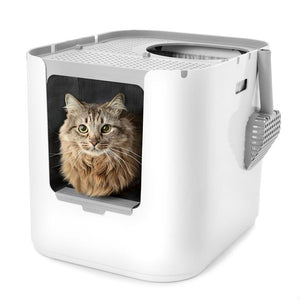
"It looks nicer than any other hooded or open option we considered."

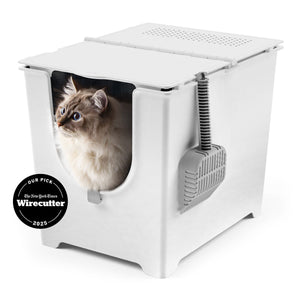
"This litter box keeps everything in, nothing gets out the sides."
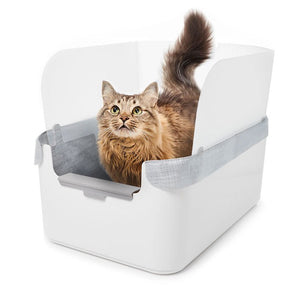
"My beautiful ragdoll cat and I both love the new Modkat Litter tray!"

